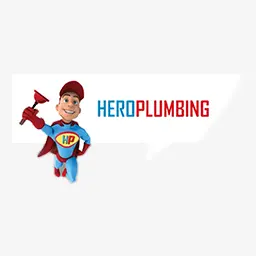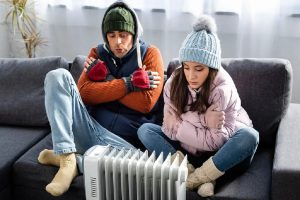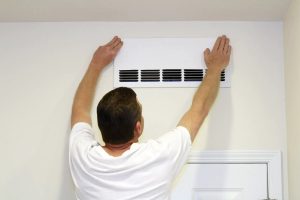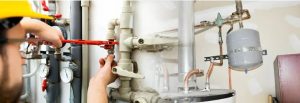Table Of Contents
- Indoor Gas Heater Safety
- What Is A Gas Heater?
- Are Indoor Gas Heaters Bad For Your Health?
- Unflued Heaters Release Air Pollutants
- Checking If Your Heater Is Leaking Carbon Monoxide
- Reduce The Health Hazards Of Unflued Gas Heaters
- Can You Leave Your Gas Heater On Overnight?
- What Heater Is Recommended For Indoor Heating?
- Why Is Servicing Your Gas Heater So Important?
- How To Use A Gas Heater Safely
- Contact A Professional For Your Gas Heater Needs
Indoor Gas Heater Safety
Indoor gas heaters have become a common appliance in most households nowadays. Most gas appliances like gas heaters that are available in the market emit carbon monoxide, a poisonous gas, which raises some safety questions. If you own one, this might leave you concerned whether your gas heater is safe.
Well, it is okay to be concerned as safety is crucial, but it is also essential to understand that its safety highly depends on how you use and maintain your gas heater. This article will provide you with the necessary information regarding indoor gas heaters and the safety measures you can observe to guarantee your and your family’s well-being.
What Is A Gas Heater?
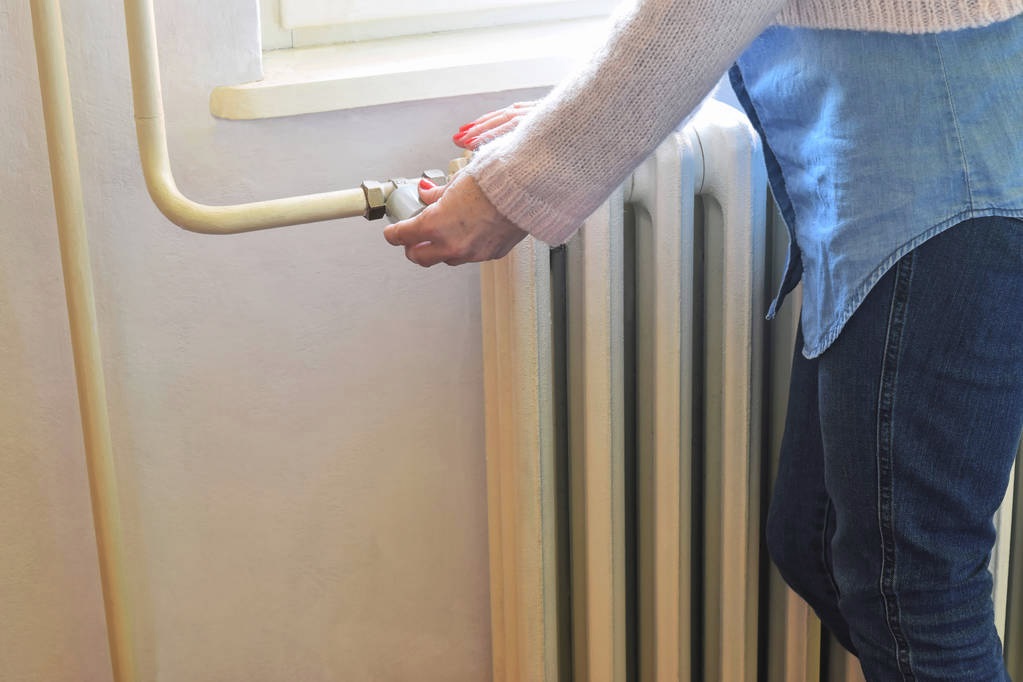
A gas heater is literally what its name suggests. It is an appliance used for heating a room or outdoor area with the help of natural gas or LPG. The two most commonly used types of gas heaters are flued and unflued.
Gas heaters are gas appliances, meaning they produce heat by burning gas; they mostly release water vapour and other air pollutants as by-products. Flued gas heaters are vented, which means that the produced air pollutants or water vapour are released outside through a chimney or flue. On the contrary, unflued gas heaters do not have any vent, which means that they release the air pollutants directly into your house.
Even though the amount of pollutants being produced depends on the type of heater you own, correct installation, and how you use it, you are bound to face some effects. As mentioned, unflued gas heaters do not have any vents, making them very prone to causing indoor air pollution or even carbon monoxide poisoning.
Are Indoor Gas Heaters Bad For Your Health?
Indoor gas heaters are not supposed to affect your health in any way unless they are faulty. They are designed to be used specifically indoors, and so if used correctly, you should not be worried about experiencing any issues. But sometimes, if you fail to use them as instructed or forget to have them serviced, they can cause serious problems. Most indoor heaters available in the market recommend having them serviced within two-year intervals, not more than that.
You should also ensure that you maintain the ventilation in your space properly if you use an unflued gas heater. Otherwise, too many air pollutants might get trapped in the room, leading to health problems. Manuals are there for a reason, and so use them properly. Read them thoroughly and then set it up. Another common mistake people make is using outdoor heaters inside the home. Never make that mistake! Remember that they are outdoor heaters for a reason.
Unflued Heaters Release Air Pollutants
You are most likely to be exposed to air pollutants if you are using an unflued or unvented gas heater. Carbon dioxide (CO2), carbon monoxide (CO), nitrogen dioxide (NO2), and water vapour are the by-products of combustion in a gas heater. But among these gases, carbon monoxide and nitrogen dioxide are toxic gases that can affect your health. Water vapour might not be as dangerous to your health, but it contributes to the growth of mould and mildew in your house, which is just as dangerous to your health.
However, the amount of pollutants being produced depends on factors like the type of heater, how it’s being used, and how often it is serviced. Also, the amount of air pollutants in the room depends on ventilation, the rooms’ size, and if other unflued gas appliances are present. Knowing if your gas heater has a safety alert or not is also crucial.
If you haven’t been using your gas heater the right way or it is faulty, there is always a chance of a gas leak. Being exposed to air pollutants or having a gas leak can affect your health more than you actually think. Carbon monoxide and other pollutants are released when a gas leak is left untreated. Such toxic pollutants can cause various health issues resulting in impaired physical health.
The most common physical symptom that you can have by being exposed to air pollutants, especially carbon monoxide, are:
- Trouble breathing
- Feeling lightheaded and drowsiness
- Constant mood changes
- Flu-like symptoms
- Irritation in ear, nose, and throat
- Chest pain
- Nosebleeds
The terrifying thing about being exposed to air pollutants is that the effects do not come immediately. Also, as carbon monoxide poisoning symptoms are similar to that of flu or food poisoning, you might often overlook the actual cause of your symptoms. As a result, you have to be very intentional while observing your symptoms.
Checking If Your Heater Is Leaking Carbon Monoxide
Gas leaks can be a common issue if you use any type of gas appliance like a gas heater. If you suspect that your heater might be leaking carbon monoxide, look for these common signs:
- Sulphur smell: Does your house smell like sulphur or rotten eggs? If yes, then there is the likelihood that there could be gas leaking from your gas heater.
- Browning shrubbery: Gas heaters are usually connected to a gas line that connects your house to the provider. If there is any possibility of a leak, your outdoor grass might turn brown. If you notice this, then there is a gas leak.
- Pilot flame colour: The pilot flame of your heater should always be blue and not any other colour. If it’s turning orange or red, it is a sign that carbon monoxide is being produced.
- A hissing sound: Hissing sounds signify a gas leak is happening. So, if the sound is coming from your gas heater, call a licensed gasfitter immediately to deal with the issue.
If any of the indicators above match what you are experiencing, turn the heater off immediately and get some fresh air. Do not forget to have the heater checked by a professional gasfitter as soon as possible.
If you think there is a chance of carbon monoxide poisoning due to your heater, here’s what to do:
- Immediately turn the heater off.
- Evacuate all household members and pets from the house immediately and open all the doors and windows.
- Leave the house quickly and get some fresh air.
- Call 000 in case there is an emergency and ask for help.
- Do not use the heater until a licensed gasfitter comes and checks it out.
Reduce The Health Hazards Of Unflued Gas Heaters
Unflued gas heaters are the most commonly used gas heaters because they are easy to use. As they are ventless, you do not have to go through any hassle fitting the vents, etc. Unfortunately, their ventless nature poses a lot of risks that you might face if not used as instructed. The most effective way to reduce the hazards of ventless heaters is to switch to a vented gas heater. However, if that is not an option for you, make sure to follow the following instructions:
- Use approved gas heaters with ODS pilots.
- Make sure to follow the operation and maintenance instructions to a tee.
- Do not use an oversized heater. Ensure that the size you opt for meets your house’s needs. Reach out to an expert to help you determine the right size of gas heater for your residence.
- Remember not to operate the heater for more than four hours at a time.
- Refrain from using them in bedrooms, bathrooms, or any confined spaces.
- Make sure to keep proper ventilation in the house.
Can You Leave Your Gas Heater On Overnight?
When winter comes, you want your room to be warm to have a good sleep at night. But can you keep a gas heater on overnight? The answer to that is no. Leaving your gas heater on for the entire night could be quite risky. It is especially true if it is an airtight room like your bedroom. Therefore, turning your heater off as you sleep is highly recommended.
The thing about gas heaters is that they constantly emit carbon monoxide, which can cause various health issues. So, when you leave your gas heater on overnight, the amount of CO (carbon monoxide) can exceed the safe levels. This may result in you and your household members experiencing effects like suffocation, chest pain, headaches, and more. If there is anyone in your house with heart issues or is pregnant, you need to discuss this matter as soon as possible as they are at a greater risk.
There is also a chance of sleep death in the worst-case scenario. Carbon monoxide detectors are a great way to prevent such occurrences as it alerts you if the amount of CO is more than the safe level. But all in all, even though it might be comfortable to sleep with a heater on, do not do it as it’s for your own good.
What Heater Is Recommended For Indoor Heating?
Choosing indoor gas heaters can be pretty difficult as so many options are available in the market. But vented or electric heaters are mostly recommended as they are safer, and they will also be able to heat a room safely for a more extended period. Even though they emit CO, CO2, NO2, and water vapour, they are correctly emitted because of the correct vent system.
Pollutants level will not increase in your house as they will, in fact, get emitted out through the vent pipe. However, you still have to ensure that you get your heater serviced every two years to ensure that everything is operating well. Finally, ensure that you replace old heaters immediately if you have any in your house.
Why Is Servicing Your Gas Heater So Important?
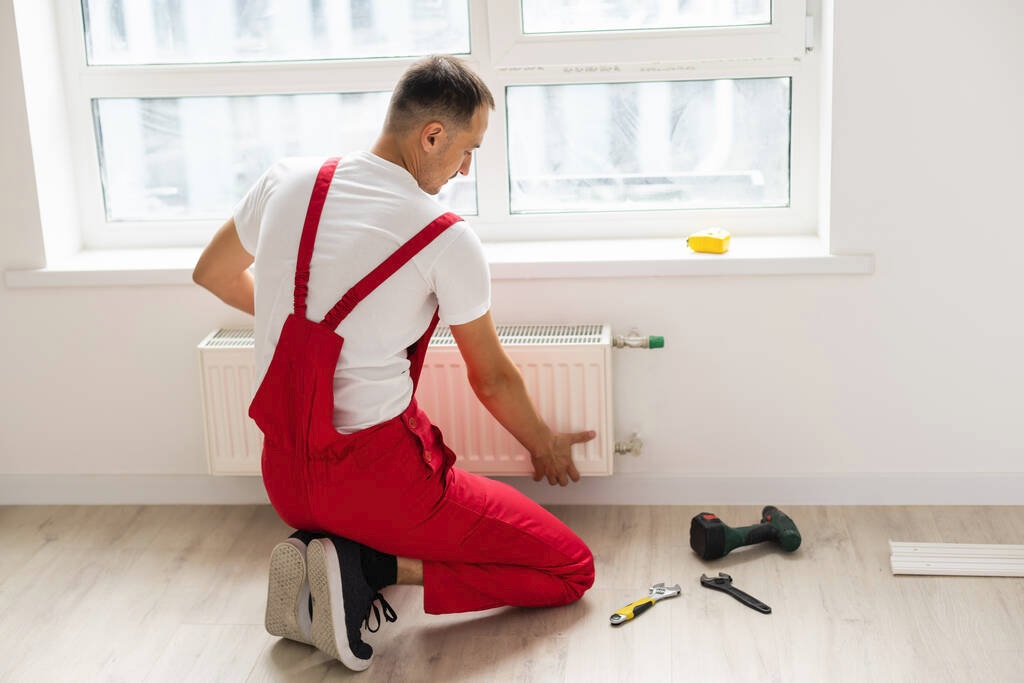
You should service your gas heater every two years and get it tested for carbon monoxide leaks in all the possible areas. Servicing is something that most people overlook after they buy a heater. However, it is vital to do so to prevent any gas-related accidents from happening.
If you are renting the house you live in; the rental provider should make sure to have a gas heater safety check done every two years by a professional. You should also ensure that the renter tells you the date of the last time they had the inspection done. Do not let anyone other than a licensed gasfitter who has training on detecting and solving risks of carbon monoxide leaks do the job.
Before you book anyone, make sure to check if they have the proper equipment and have completed their training. Otherwise, you might be leaving such a sensitive task to someone with insufficient training, which also puts your life and your family at risk. In addition, emergency servicing should be done if there are yellow flames, the wall becomes too warm, or the pilot light goes out unexpectedly.
How To Use A Gas Heater Safely
Instructions are there for a reason. However, many people overlook them, which could result in unavoidable consequences. As a result, you should always follow the instructions contained in the manufacturer’s guide to ensure that you know how to use your gas heater correctly. It is also advisable to get other members of your household to acquaint themselves with the instructions.
Below is a list of do’s and don’ts while using your gas heater:
Do’s
- Never forget to read the gas heater’s manual and follow the instructions for a proper setup and safety.
- Don’t use any gas heater unless certified by the Australian Gas Association (AGA) or SAI Global (Australian standards information and compliance organisation).
- Ventilation is key, so make sure that there is plenty of it in your house. It is crucial as it helps the fumes to flow out of the house and allows fresh air in.
- It is better to avoid running exhaust fans if you have an unflued gas heater, as this may result in CO leaking into the room.
- Cleaning your heater by vacuuming is crucial to reducing any dust buildup. The filter should also be cleaned for proper airflow.
- Keep children and pets away from the gas heater to avoid any accidents.
- While drying any clothes inside, be extra cautious and keep anything flammable at a distance of approximately one metre from the heater.
- Check if there is any safety alert issued for your gas heater.
Don’ts
- Don’t leave your heater running when you go to bed.
- Never use an unflued gas heater in an enclosed location like your bedroom, bathroom, or caravan.
- Make sure not to use or store solvents, pressure packs, or aerosols near a gas heater, even if it’s off.
- Don’t ever dispose of any rubbish in a gas fire as it can produce dangerous pollutants.
- Outdoor appliances like outdoor heaters or barbecues should never be used indoors.
- Don’t place your heater in places where the painting is being done or has recently happened.
Additional Safety Tips
- Make sure not to use or store gas cylinders indoors.
- Patio heaters should be stable or fixed and used only outdoors.
- Industrial-type heaters should never be used for any domestic situation, no matter what.
- Always refrain from using a cabinet heater.
Contact A Professional For Your Gas Heater Needs
If you choose the correct heater and use it properly, you should face no problem using your indoor gas heater. However, if you encounter any issues, you must contact reliable professionals near you to fix the problem. Simply put, always remember to follow the safety tips, do the servicing in time, and call an expert professional for any kind of service to ensure that your gas heater is safe to use.




